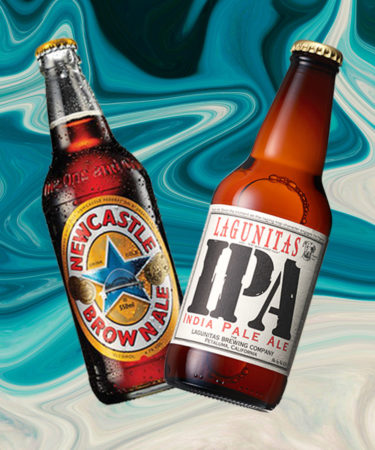On Tuesday, Lagunitas Brewing, a Heineken-owned craft brewery based in Petaluma, Calif., announced it will be cutting 12 percent of its workforce. CEO Maria Stipp cited a changing craft beer market as a reason for the downsizing.
Lagunitas will also begin brewing Heineken-owned Newcastle Brown Ale at its Petaluma and Chicago facilities, indicated by a new label approved by the Alcohol and Tobacco Tax and Trade Bureau.
In addition, two of Heineken’s Mexican imports, Tecate and Dos Equis, will debut new labels this and next year. Tecate is dropping a bigger, boozier (7.5 percent ABV, 24-ounce) version of Tecate Titanium; and Dos Equis is debuting a new Mexican Pale Ale, along with a new can design for its Lager Especial that reads, “Mexico Is the Shit.”
The latter is a partnership with Mexico is the Shit (MITS), a streetwear and lifestyle brand; the co-branded cans will be featured at events and pop-ups highlighting emerging Mexican artists.
On the one hand, Heineken’s moves prove that when an American craft brewery sells to an international corporation, things absolutely do not stay the same. Lagunitas’ workforce cuts and contract brewing, in the eyes of independent craft brewers and consumers, are not cool.
On the other hand, I see a savvy international player taking risks in one of the world’s most important beer markets. The U.S. is the No. 2 beer consuming country by volume, second only to China. By bringing Newcastle production stateside and importing new Mexican lagers — an import category that is dominating — American fans of these brands may have a chance to drink cheaper, fresher Newcastle, stronger Tecate, and Dos Equis, which supports Mexican artists.
Heineken is making moves, and I sort of respect it. I don’t see this solely as a huge brewery stomping out American brands; I see a truly global player bringing affordable, interesting imports stateside. If it means more competition among the big guys, great.
Anheuser-Busch Soars to Infinity and Beyond (Beer)
On Monday, Anheuser-Busch InBev announced that Felipe Szpigel, president of ABI’s Craft Unit and High End division, will leave his position. Szpigel will remain an employee of ABI, developing a new brand in the “beyond beer” category, a spokesperson told VinePair.*
Mika Michaelis, VP sales for a region that includes California, Nevada, and Arizona, will take Szpigel’s place, effective January 2019.
Beer companies snatching up other beverage brands is nothing new. ABI acquired Virtue Cider, Spiked Seltzer, and Hiball, a non-alcoholic energy drink. MillerCoors owns Crispin Cider, Henry’s Hard Sparkling Water, Henry’s Hard Soda, and Arnold Palmer Spiked (and let’s not forget Zima!). Boston Beer, considered a small and independent craft brewery by the Brewers Association, picked up Angry Orchard Hard Cider, Twisted Tea, and Truly Spiked & Sparkling.
Additionally, a new report from Planet Market Reports predicts the global non-alcoholic beer market will grow at a compound annual growth rate of 11 percent between 2018 and 2025. Its key market players? ABI and Heineken, among others.
And remember when ABI appointed a chief non-alcoholic beverages officer in July?
Beer’s hold on American drinkers is loosening, and breweries large and not-so-large are turning to “innovations” in other beverage spaces to pick up the slack. It’s only a matter of time before they swipe up my beloved Spindrift (don’t do it, Spindrift! Or, if you do, good for you.)
Smaller brewers might want to take note of what these moves by the ABIs, MillerCoors’, and Boston Beers of the world mean. People are looking for healthier alternatives to social drinking. A small and independent craft brewery might not be able to (or want to) acquire a hard cider or soda brand, but it might offer infused sparkling water in its taproom; let a new brewer experiment with kombucha; or make a Brut IPA so brut, it looks and tastes like hop seltzer (kidding … sort of). Whatever the case, don’t ignore what consumers are asking for: low-ABV variety.
*Updated 10/04/2018 12:33PM
Beer Musketeers Band Together to Fight Shrinking Market Share
Monday, Sept. 24 marked the official launch of the “Beer Growth Initiative,” an effort of three beer trade organizations — the National Beer Wholesalers Association (NBWA), Brewers Association (BA), and Beer Institute (BI) — to fight against beer’s dwindling market share in the face of other alcoholic beverages.
Their leader is Tamarron, an alcoholic beverage consultancy, backed by a committee that includes members of all three organizations. You might call it the “Got Milk?” or the “Beef, it’s what’s for dinner” of beer, Brewbound reports.
The group’s goals will include growing beer sales, and reaching untapped markets such as women, minorities, and Generation Z consumers. They’ll make beer “relevant” to these consumers with strategies such as digital advertising. (You know, ’cause the kids are all on their dating apps instead of meeting people at bars.)
The Beer Growth Initiative, though its goals may sound lofty, is a step in the right direction. The beer category is losing market share to wine and spirits. Infighting is a natural progression of a new, booming business, but it’s time to turn that energy toward keeping beer afloat. It’s embarrassing that it’s taken this long for groups like the NBWA, BA, and BI to focus on consumers they “struggle” to reach — like women and people of color — but at least it’s happening now. I believe there’s a beer out there for everyone; it’s just a matter of getting it into their hands.
